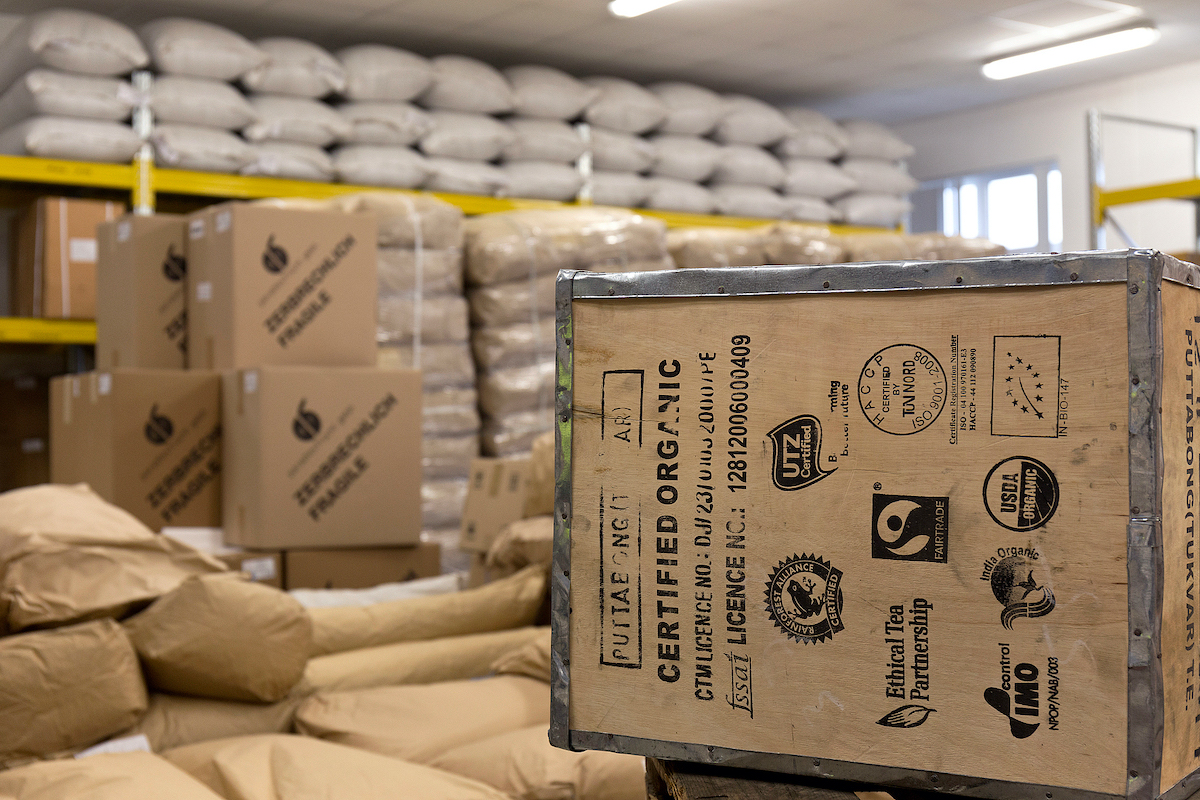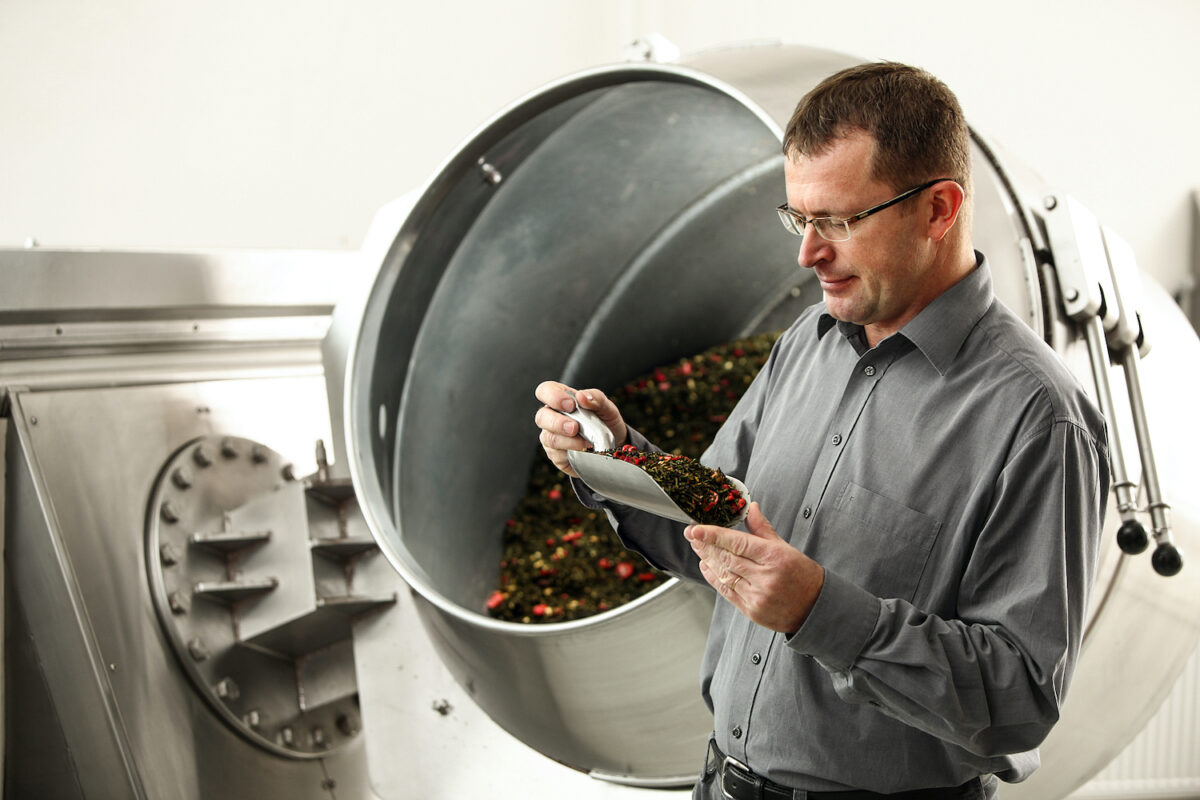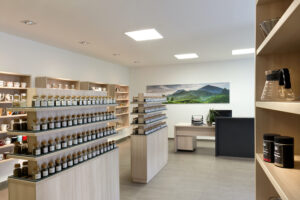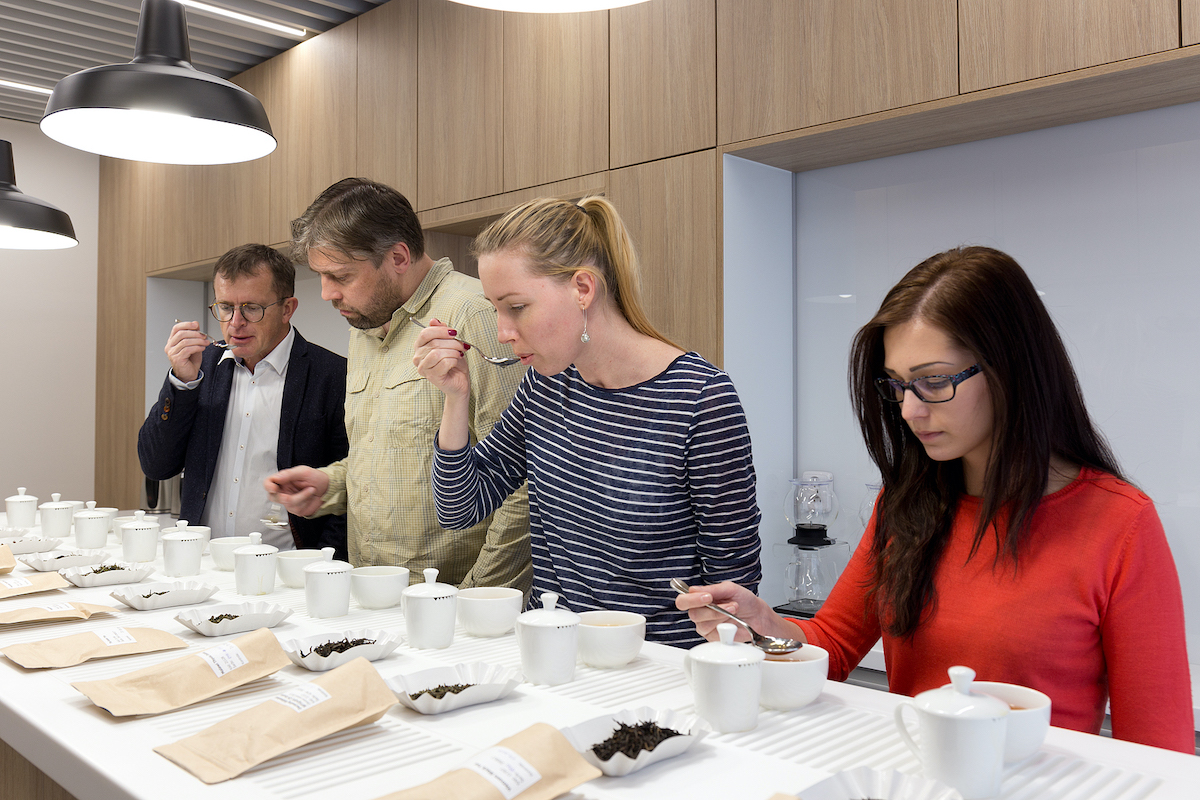Over centuries, taking tea together encouraged social cohesion and discussions, regardless of borders and cultures. Tea has also been associated with wars and crises and consistently endured such difficult periods. Moreover, tea’s role in building bridges between cultures and promoting cosmopolitanism is demonstrated by the success story of a remarkable company based in Slušovice, in the Czech Republic, approximately ten kilometers northeast of Zlín. The firm is OXALIS.
Tea, Czech Culture and Freedom
Tea culture in the Czech Republic is unique. Countless tea rooms, called cajovna, invite you to linger and relax not only in the capital, Prague but in every village. Anyone claiming that the number of tea rooms throughout the Czech Republic merely reflects a preference among Czechs for tea forgets that tea holds a deep cultural and historical significance. Fairly, the term “historical” in this context requires an explanation: Most tea rooms in the Czech Republic originated in the 1990s. However, delving further into the past reveals that it is indeed connected to the country’s history that Czechs developed a taste for good tea or rediscovered it after the country’s opening following the fall of the Iron Curtain. As a reminder, even in this context, tea signifies more than just a hot beverage.
To this day, historians seem divided on when tea first appeared in the present-day Czech Republic. Various legends and unconfirmed records surround this question. However, they agree that tea gained increasing popularity among the population during the 19th century. Tea parties were already held in some households in the second half of the 19th century.
The first (Japanese) tearoom is said to have been built in 1908. However, the burgeoning tea culture essentially halted with the onset of the First World War. And in the following years, one might say, Czechs had other concerns than their supply of tea. During the period after the communist coup in 1948, when Czechoslovakia became a satellite state of the Soviet Union, the population primarily sourced their tea, whose quality was likely subpar, from Russia. Tea specialties, as offered today in popular tea rooms, were virtually unavailable, and if they were, they were smuggled into the country. In a figurative sense, Czechs also regained their freedom in this way. Sip by sip. When the government opened and democratized due to the Velvet Revolution, there was no holding back in rediscovering Czech tea culture. Opening numerous tea rooms throughout the Czech Republic from the 1990s onward was a form of expression of the curiosity suppressed for decades and now rediscovered cosmopolitanism and the unbroken pursuit of freedom.

The Beginnings of OXALIS
A strong awareness of freedom had always been inherent in the founder of OXALIS, Petr Zelík. His interest in geography and languages motivated him to pursue studies in foreign trade at the University of Economics in Prague. It’s worth noting that this was when the communist regime of the Soviet Union had control over Czechoslovakia and imposed strict restrictions on freedom of speech, assembly, and other civil liberties. Due to the reasons mentioned, seeing the world through different eyes than what was common, or even possible, on the eastern side of the Iron Curtain was deeply rooted in Zelík’s being. The accompanying questioning of an entire system was, therefore, anything but a simple, let alone risk-free, endeavor. But as it turned out, Zelík did not want to adopt a different worldview alone. Conversations with his fellow students in the dormitory encouraged them to reflect on their history and consider options for living under the existing communist regime, influenced by the growing knowledge of alternative perspectives.
The upheaval that began in 1989, known as the Velvet Revolution, was about to change everything. It also marked a new era for Petr Zelík. His dream of traveling to foreign countries could now be realized due to the removal of all administrative obstacles. However, money was tight, but that didn’t stop him from buying a ticket to travel by train across Europe. More travels would follow, shaping him profoundly. The realization that he would one day embark on his personal tea journey and find his calling in the tea trade would only become apparent later and by chance. Some things simply take time, creativity, and perseverance.
Regarding Petr Zelík’s professional career, success was not evident initially. His attempts at entrepreneurship, which began with a trading company founded with former associates, resembled a roller coaster ride. Zelík’s trading company dealt with anything that came their way as young merchants. Eventually, opportunities arose that were previously unthinkable, not least due to the country’s opening. These opportunities were to be seized.

Early Encounters with Tea
Zelík’s first encounters with tea came about unexpectedly through contact with an employee of the Teekanne Branch in Austria, who shared product samples from the already significant German tea family business. Zelík and his team saw potential in trading these and other products previously unknown in the Czech Republic. They made up for their lack of product and market knowledge with determination, enthusiasm, and drive.
In a short time, they managed to acquire the branches of a supermarket chain in Ostrava and Brno as customers. In the following year, 1991, they achieved a turnover of 80 million Czech crowns (CZK), with tea from Teekanne accounting for the majority. However, the trade in nuts imported from Hamburg preserved mushrooms from the Netherlands and fruit juice from East Germany also contributed to their success.
High-quality tea was rising in the Czech Republic, displacing the qualities imposed on the Czechs over decades. It would again prove true that good tea always prevails and outlast crises. Consumers in the Czech Republic evidently liked the newly available tea products. As it turned out, their consumption habits increasingly mirrored those of their Western neighbors. Tea once again proved to be a bridge builder and a symbol of openness to the world to which the Czechs had always felt connected. But the rediscovery of Czech tea culture is more than the result of reordering supply and demand, from which Zelík and his team undoubtedly benefited. The significance of tea in Czech culture and society would only become apparent later. And in this regard – by now, there should be no doubts – Zelík made his contribution.
As the collaboration with Teekanne solidified, another journey was on the horizon, profoundly shaping Zelík’s view of the world in general and his perception of the tea world in particular. The destination of this journey was the tea-growing regions of Sri Lanka, which captivated Zelík not only with fresh tea as far as the eye could see but also with a Buddhist country full of smiles and modesty and seemingly endless tea plantations. Literally, fresh tea and the nation’s post-colonial atmosphere worked their magic on his mind. It was the contrast between the ongoing, wild, revolutionary ferment at home and the calm, unspoiled life on the plantations that inspired him to make a change.
Zelík brought home a longing for simplicity, a need to focus on one thing, and a desire for inner peace. These were all things he took to heart and intended to implement in his approach to the tea trade. Indeed, changes did not take long to manifest. After Teekanne decided against building a processing unit in Lípa near Zlín, and Zelík intended to increasingly focus on trading loose tea (while Teekanne primarily focused on packaged teas), it was time to (temporarily) sever ties with Teekanne and look for new options. A new supplier of loose tea based in Vienna, Austria, was quickly found. Shortly after that, in 1993, Zelík founded OXALIS.
The Business of Selling Loose Tea
 The business of selling loose tea (later supplemented with tea-related accessories and gift packs) Zelík realized with a concept consisting of a specialized tea shop downstairs and a stylish tea room on the floor above in Zlín initially got off to a slow start despite high expectations. Zelík was exploring alternative businesses when relief came with the resumption of contact with Teekanne in the spring of 1995. For the newly established corporate premises in Volyn, South Bohemia, managers in Salzburg, Austria, were searching for a managing director. Fortunately, Zelík’s prior signing of a lease to open a tea shop in a shopping center in Prague did not hinder his acceptance of the new position as managing director for Teekanne. With the active support of his father, whom he hired as managing director for OXALIS, Zelík continued to pursue his mission and further develop his young company. This endeavor gained momentum in the following years, partly due to the success of other premises in another Prague shopping center. In 1998, Zelík once again parted ways with Teekanne to be able to devote his full attention and energy to his own company, OXALIS.
The business of selling loose tea (later supplemented with tea-related accessories and gift packs) Zelík realized with a concept consisting of a specialized tea shop downstairs and a stylish tea room on the floor above in Zlín initially got off to a slow start despite high expectations. Zelík was exploring alternative businesses when relief came with the resumption of contact with Teekanne in the spring of 1995. For the newly established corporate premises in Volyn, South Bohemia, managers in Salzburg, Austria, were searching for a managing director. Fortunately, Zelík’s prior signing of a lease to open a tea shop in a shopping center in Prague did not hinder his acceptance of the new position as managing director for Teekanne. With the active support of his father, whom he hired as managing director for OXALIS, Zelík continued to pursue his mission and further develop his young company. This endeavor gained momentum in the following years, partly due to the success of other premises in another Prague shopping center. In 1998, Zelík once again parted ways with Teekanne to be able to devote his full attention and energy to his own company, OXALIS.
Building on the successes Zelík had already achieved with OXALIS during the 1990s, the product range was expanded in 1999 to include coffee, resulting in increased sales. Tea sales alone were insufficient to cover the costs, especially considering the high rents in the Prague shopping centers. Coffee continues to play an important role in OXALIS’s product range. Since 2011, the coffee beans have been roasted in-house, and selected coffee specialties are kept in stock. Business contracts based on direct trade also proved to be profitable.
Additionally, the specially developed flavored tea blends were well received by consumers. Another product category, which is still referred to as “treaty treats,” was introduced. This category was gradually expanded to include honey, cordials, chocolate, cocoa, sweeteners, and liqueurs. These decisions made valuable contributions to the company’s financial development because OXALIS no longer sold goods from Hamburg or Austria but benefited from better margins.
A Pulse on Consumers
It cannot be denied that Petr Zelík recognized the desires of consumers early on, although the path to fulfilling them proved to be rocky from an economic perspective at the outset. Nevertheless, Zelík struck a chord with the times by introducing Czechs to a quality of indulgences whose availability was unimaginable before the country’s opening. Generally, it was a time of prosperity and new beginnings, during which OXALIS’s revolutionary character and face were also formed. Thus, OXALIS opened its first tea shop in the Czech capital in a renovated shopping center, the first in the Czech Republic, oriented towards those in Western countries. It attracted many visitors from Prague and beyond, who were also convinced by the appearance and furnishings of the OXALIS tea shops. It was furnished in dark wood with a slight shade of cognac. The counter design featured holes for glass jars containing loose-leaf tea, and the walls were fitted with shelves to hold the accessories on sale. This simple style was carried over to every shop afterward until a major change in design in 2015.
Although there were changes in the design of the tea shops over the years, they were always perceived as places inviting one to escape the everyday stress of the cities and enjoy a moment of peace and relaxation. The contrast between the restlessness of the upheaval in his homeland and the calm and tranquility that Zelík perceived on his journey to Sri Lanka may have inspired this. Even today, the goal of designing tea shops is to give them a feeling of simplicity, airiness, and modernity. Consumers so well received the first OXALIS tea shops that OXALIS continued to expand, and by the end of the 1990s, it already owned five stores.
The Culture of Czech Tea Rooms

To appreciate the success of the OXALIS tea shops, it is worth looking at the parallel emerging culture of Tea Rooms in Prague and beyond. To this day, these offer a unique experience that differs from cafes and pubs. While they may not match the number of cafes and pubs, they certainly match in importance for their visitors. They are not just places to drink tea but also retreats for people who appreciate an environment free from cigarette smoke and alcohol. Moreover, they invite people to engage in long conversations with like-minded individuals and sometimes even embark on spiritual experiences. In this way, they offer an alternative to smoky and noisy pubs and have become popular meeting places for young people. Tea is seen there as a way of life that connects culture and spirit. With the opening of his tea house in the peaceful Zlín in 1994, which included both a tea room and a tea shop, Zelík is also considered a pioneer in this regard. Whether tea is offered for consumption on-site or at home, in both cases, thanks to the revolution in Czech tea culture, it has become a symbol of cultural exchange and social cohesion.
The consistently positive feedback from OXALIS customers hinted at another business opportunity: a franchising business, although initially not in the traditional sense of franchising, but rather wholesale businesses that came with an agreement to present the sold teas in the supplied glass jars. This new business field also proved to be a creative and rewarding solution to bring the company’s products to market and subtly establish and shape Czech tea culture in otherwise atypical and sometimes tea-foreign places such as flower shops. From an economic perspective, owning stores and a franchise system paid off and still forms a solid foundation for today’s growing and evolving company.
Initially, the idea of OXALIS succeeding in exports seemed unthinkable. Trade within the Czech Republic proved to be too slow to consider export as an option. The export potential only emerged after the company could refine tea through blending and flavoring in-house. In this way, the company began creating unique, original products according to its recipes, increasing its competitiveness and reducing costs without compromising profit margins. This turning point at the end of the 1990s enabled entry into the neighboring market of Slovakia, soon followed by Poland, Hungary, and some countries of the former Soviet Union.

Adding accessories with individual designs from OXALIS significantly increased opportunities in this area, as OXALIS was able to distinguish itself from the competition. Today, OXALIS exports to more than 34 countries, with the number constantly increasing. Poland has the largest market share among these countries and still has significant growth potential. Other important target countries are not only scattered within the borders of Europe. True to the motto “Tea knows no borders,” OXALIS is active in distant markets such as India, Singapore, and Malaysia.
The Business of Tea
In 2017, OXALIS surpassed a turnover of 250 million CZK for the first time. The number of permanent employees has reached 150, with dozens of temporary workers not included in this count. The retail network has expanded to over 60 OXALIS sales outlets – over 20 own stores in the Czech Republic, a handful of stores in Slovakia, and over 30 franchising outlets, which together account for more than half of the total turnover. Another 25% comes from exports, with the remaining portion from hundreds of retailers selling specialist products or gifts or operating health food outlets. Regarding the share of products in turnover, tea still predominates (60%), while coffee and accessories/gift packs each make up 20%.
Since 2017, the diversification into various business areas has been reflected in a restructuring: In the form of a holding structure, the newly established OXALIS a.s. (plc) acts as the parent company, while four limited liability companies follow the different business fields: OXALIS (a wholesale distributor), OXALIS retail (an operator of shops), OXALIS real estate (an owner of property), and OXALIS Slovakia (for shops in the Slovak Republic). The new organization clarifies the company’s economic activities, increases transparency outwardly, and secures matters in a general sense.
As the company has evolved over the years, so has the tea world. Czech tea drinkers, in particular, have witnessed a transformation unlike any other. Petr Zelík has always been instrumental in shaping this transformation through his company, OXALIS. Going down new paths was challenging yet crucial and forward-thinking. OXALIS has consistently been a trendsetter and beneficiary of development, significantly influencing the revived tea culture and its curious and cosmopolitan tea community. For quite some time, the networking of the tea world and other aspects of the global tea trade has increasingly taken place online. Zelík embraces this evolution. Since the early 2000s, OXALIS has maintained a regularly updated website and supplemented it with an e-commerce solution. English and Russian versions followed, along with collaboration with an online advertising agency. Further redesigns and the introduction of new services such as pickup points and online payments became indispensable, reflecting the growing demand. Today’s version of the website boasts advanced features and mobile scalability.
The rise of Facebook and social networks also allowed OXALIS to present itself differently and communicate with customers. OXALIS’s Facebook profile, launched in November 2011, has since garnered tens of thousands of followers, becoming an important channel for disseminating information. In addition to separate Czech profiles for the Matcha green tea brand (Moje Matcha) and Ikona Coffee, profiles for OXALIS in English and Slovak were also launched. Instagram, a later addition to the scene, was widely embraced by young people. There was also an opportunity to engage with this youthful demographic and familiarize them with the OXALIS brand.
Despite the emergence of new technologies, Zelík emphasizes that the best advertisement remains the OXALIS retail outlets. The company’s tea shops are now present in every major city in the Czech Republic, particularly in bustling shopping centers. These tea shops have proven crucial in boosting brand awareness, consumer interest, and sales. Regular training of the sales staff also contributes to this success. Their expertise and product knowledge enable them to provide excellent customer service, making the shopping experience highly enjoyable.
Tea As A Bridge
The idea that tea brings people together is evident in OXALIS’s marketing and ingrained in its overall concept in various ways. This is further exemplified by the company’s strong commitment to charitable causes. Through partnerships with organizations like SMS, which supports young people with multiple sclerosis, OXALIS promotes the health of those affected. Studies have shown that consuming green tea contributes to the well-being of individuals with this condition. Therefore, a certain percentage of the revenue generated from green tea sales is donated annually to this cause. Additionally, OXALIS collaborates closely with SOS Children’s Villages and the Czech Red Cross, demonstrating its significant commitment to philanthropy.
Petr Zelík is particularly proud of a new and unique form of collaboration: OXALIS has decided to become a part of the ownership structure of Tea Studio, an innovative artisan tea factory located in the Nilgiri Mountains of India, to expand its range of unique teas. This move, quite rare among European tea companies, is expected to bolster the company’s position in the market. It has always been Petr Zelík’s aspiration to produce tea directly in the country of origin.
What Can We Next Expect From OXALIS?
Zelík and his team have established several strategic goals to strengthen the company’s position. One focus for the future is to expand cooperation with franchisees, thereby increasing the concentration of revenue in this area, which is considered the “backbone” of the company. With an increased focus on exports, the aim is to compete with Western European rivals. Furthermore, with multilateral support, OXALIS aims to become increasingly export-oriented, with plans to establish the franchise system abroad. Another goal is to launch an online shop, allowing consumers in various EU countries to purchase OXALIS products. Regarding personnel, training and development initiatives should help the company maintain and expand its productivity and knowledge advantage. Simultaneously, supporting and strengthening the organizational separation of various business areas is planned to ensure clear differentiation of tasks for employees, among other things.
From humble beginnings but always with a clear vision in mind, Petr Zelík has built a company that is now an integral part of the tea landscape far beyond the borders of the Czech Republic. The success story of OXALIS is not just one of entrepreneurial skill, perseverance, and innovation but also of a commitment to shaping tea culture sustainably and fostering cultural and societal exchange across borders. Tea has been and continues to be a symbol of openness and freedom. From this belief, not only has Czech tea culture been revived, but OXALIS has also deeply embedded these values into its corporate concept. OXALIS has helped build bridges between people of different cultures by promoting tea culture and creating spaces for encounters. Petr Zelík and his team, through their commitment to quality, innovation, and social responsibility, have had a lasting impact on the world of tea, becoming pioneers of a new tea culture. As the world of tea and commerce continues to evolve, OXALIS remains true to its mission of connecting people through tea and making the world a better place, one sip at a time.
One of the original tearooms and companies in Prague, Dobrá Čajovna, has really taken tea around eastern Europe, as well as to the US since the mid 1980s, partnering to open tearooms from Ashland, Oregon, US to Wroclaw, Poland. In each tearoom, tea is served traditionally from the tea lands of China, Japan, South Korea, India, Sri Lanka and beyond, and coffee is not allowed because its odor overtakes that of the tearoom. I was one of those folks to open a tearoom and get to travel with the founders of Dobra Tea around Asia and beyond. The tearooms of the Czech Republic are sure not to be missed.
This is a very nice article. Happy to see the work of OXALIS. I am sure they will take the Tea Journey further with their knowledge so that many could enjoy a cup of tea at par across the world.
I really hope to visit their Tea rooms sometime in the future when I travel that part of the world.
Good luck and keep the tea in high spirits !!!